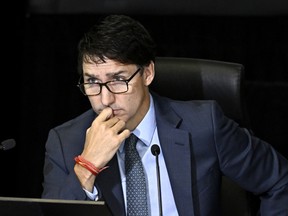Diane Francis: Canada’s immigration problems are of Trudeau’s own making
Trudeau has been putting his own interests above those of the Canadians he is supposed to serve
Author of the article:
Published Oct 22, 2024 • Last updated Oct 22, 2024 • 3 minute read
14 Comments

The global immigration mess spreads because asylum laws are easily gamed and smuggling is an industry unto itself. Europe and the United States have been deluged with people from nearby impoverished, corrupt or war-torn countries.
Canada, on the other hand, should not have a problem — but it does. It shares a border with the United States and oceans separate it from the world’s trouble spots. But Canada’s political system is dysfunctional. Prime Minister Justin Trudeau vastly increased the number of immigrants, temporary foreign workers and asylum seekers who are admitted to Canada every year.
“Nearly three-million people living in Canada have some type of temporary immigration status, with 2.2 million arriving in just the past two years, according to government statistics. Temporary residents represent 6.8 per cent of the country’s total population of 41.3 million, up from 3.5 per cent in 2022,” reported the New York Times.
This flood of immigrants has sparked a backlash. A recent Leger survey conducted for the Association of Canadians Studies (ACS) found that two-thirds of Canadians believe immigration levels are too high. “What’s different in this survey is that negative sentiment towards immigrants is noticeably on the rise and has also reached levels not seen in the last two decades,” said Jack Jedwab, the chief executive of ACS.
Negative sentiment towards immigrants is noticeably on the rise and has also reached levels not seen in the last two decades
Jack Jedwab
Recent immigration has contributed to economic and social problems in the two biggest destination cities, Toronto and Vancouver. Housing prices are unaffordable and health-care systems are overburdened.
“To break out of this rut and prevent this further decline in Canada’s living standards relative to our peers, policymakers must enact comprehensive and bold policy changes to encourage business investment and innovation, promote worker education and training, and achieve better immigration outcomes where more is not always better,” wrote the Fraser Institute’s Alex Whalen, Milagros Palacios and Lawrence Schembri in July.
In a recent interview with the Financial Post, Patrick Brown, mayor of Brampton, Ont., attested to the problems caused by Ottawa’s irresponsible immigration policies, notably the flood of student visas handed out in recent years. For several years in Brampton, storefront operations advertised that they could obtain student visas for foreign students in return for a fee.
Mayor Brown said there were “private ‘colleges’ in plazas.… We found legitimate universities and colleges and also the wild west. A number had been approved by the (Ontario) Ministry of Colleges and Universities. But some had not. Now, international students must go to the public (government-funded) schools, not the private ones.”
It appears that federal immigration officials were approving student visas for people to go to questionable, or even non-existent, colleges. This is now getting “cleaned up,” according to Brown. But how many of the student visa holders who are already here are actually students attending legitimate institutions? How many of these “colleges in plazas” have been shut down or investigated?
Recommended from Editorial
Though Trudeau has looked to put curbs on immigration in recent months due to the undeniable problems his reckless policies have caused, it has become abundantly clear that he has been putting his own interests above those of the Canadians he is supposed to serve.
